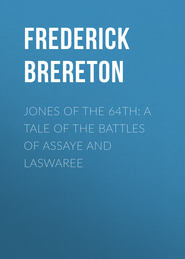По всем вопросам обращайтесь на: info@litportal.ru
(©) 2003-2024.
✖
The Hero of Panama: A Tale of the Great Canal
Настройки чтения
Размер шрифта
Высота строк
Поля
"And I ain't worryin'," came a well-known voice through the darkness. "I comed along here jest to see what's happenin'. Is Massa Jim right and well?"
A growl burst from Tom's lips as he recognized the voice, and at once he turned a pair of blazing eyes upon the culprit who had dared to follow him.
"Dat yo, Sam?" he demanded. "Den what fo yo dare to leave de missie? Yo get back right now, or by de poker, me knock you into twenty cocked hat! What fo yo jump overboard and risk gettin' drowned?"
The question brought a gurgle from the jolly little Sam. He laughed outright beneath the nose of the irate Tom, and, reaching the buoy, clung to it for a moment or so before he deigned to reply.
"Yo's one great big donkey, yo am, Tom," he roared, shaking with laughter. "Yo tinks yo de only man allowed to jump into de water; but dat not so. De young massa place yo in charge of de missie, and yo no right to leave. Me knows dat; me comes along right out here to haul yo back. Yo one great big blackguard."
To the astonishment of Tom and Jim the little fellow burst into violent sobs, though his words had conveyed anything but an idea of sorrow. Sam shook from the top of his woolly head to his shoeless toes, and set the buoy rocking. Big tears coursed down his cheeks, though the water dripping from his hair almost cloaked them, and when he tried to speak again he gulped at the words and failed to express them. It was, in fact, a strange if comical procedure, and for the moment Jim's muddled condition did not help him to arrive at the meaning. But he grasped the truth a moment later, for Tom helped him.
"Yo – yo one little rascal, yo!" he heard the huge fellow exclaim, though there was no anger in his voice, no resentment for the words which Sam had hurled at him. Rather there was a strange trembling which denoted friendly feeling, accompanied by a sudden gripping of hands between the two darkies which seemed to say that they were perfectly agreed. Then Jim gathered the full meaning of Sam's tears, of Tom's magnanimous action. It was joy for his, Jim's, safety that had set Sam howling, and the tears coursing down his cheeks. It was that same feeling which induced Tom to overlook the high-flown language of his small brother and grip his hand so warmly.
"You're just two great grown-up babies," he laughed across at them. "You seem to imagine that no one can do anything without you, that I'm like a piece of china, liable to break on the smallest occasion. See here, Tom and Sam, shake hands. Guess you're both of you white right away through from head to toe. I owe you both a heap for coming out after me; but mind what I've said – I ain't a piece of china. Guess I'm old enough and ugly enough to look after myself."
Tom grinned back at his young master and hung to the buoy for a while, still clinging to the hand he had offered. Then he dropped it, moved to the farther side, as if to place himself in a position of safety, and presently made his reply.
"Sah," he said, "p'raps you old enough, as yo say, p'raps no. Ugly 'nough: yes, I tink so. Yo's ugly 'nough to do one ob de stupidest tings as ever I seed. What fo yo jump into de sea like dat and swim toward a ship dat was sinking? S'pose she drag yo down? S'pose yo neber come up agin. Who den take care of missie?"
Even behind his fun there was a deal of truth. Who indeed would be left to care for the sister? But Jim had come up again, and, feeling better, he promptly made his presence felt.
"Jest swim back quick," he commanded Sam, "and tell 'em we're all right. Tell 'em to come along. We'll hang to the buoy. Now, Tom, set to splashing with your legs. There'll be sharks about here, and they're extra fond of darkies."
Tom paled for a moment under his dark skin and looked the reverse of comfortable. Then he laughed uproariously, shouted to Sam to hurry his departure, and promptly did as Jim had ordered. For it was as well to be cautious: both knew that sharks abounded in that corner of the Caribbean Sea, and some of the brutes might very well be in the vicinity. They kicked continuously, therefore, till the boat came up with a rush, and they and the injured man were lifted aboard.
"Young man, you can jest give me a grip of yer hand," cried the skipper of the foundered vessel when all were safely in the boat, stretching across to the triumphant Jim. "I guessed when you came up alongside us on the ship, telling me that you had fixed matters for your sister, and were ready to help us out with the trouble those Spaniards were giving, that you had got stuff behind you – the right sort of stuff, too. Then you tackled the hounds in proper style, so that I knew I had a man with me; a man, siree, not jest a boy. But this last thing's better than all. Guess this gentleman owes you a life. Guess he'll be for ever in your debt. Young man, I'm pleased to have met you."
It was a glowing tribute to our hero's courage, and he went crimson from the top of his dripping head to his stockinged toes as he listened to the words. Not that anyone could tell, for the gloom shrouded everything. However, Sadie, sitting beside him, clinging to his arm as if loath to part again with her protector, guessed his pleasure, while her own courageous little heart felt as if it would burst with pride.
"I'm glad you did it, Jim," she whispered, "though I was terrified. And Tom and Sam were really brave; they are so devoted. Can you believe, I had the greatest difficulty to keep Ching with me? He hates swimming, as you know, but he was very nearly following."
"Brave, honest fellows!" answered Jim with a gulp, for such devotion touched him. "They are, indeed, true friends to us."
However, he had no time for further conversation; for now that the captain had given his decision on events so recent, the mate and crew of the boat were determined to make their own voices heard.
"A right proper thing to have done: wish you was my own son," declared the former. "Shake, young man. It's a treat to meet one who's a true American."
"One of the very right sort," growled Macdougal, still trembling with excitement. "See here, young feller, I've nigh lost a job through you. I was for kicking up a rumpus direct against the old man's orders. Chief, I'm main sorry for them words and looks; but there's a time when a man has to kick. I thought you was funking."
"Funking!" exploded the mate, though the captain sat rigidly in his place, making no response. "Him funking! The man you and I have sailed with these past three years and never known to fail us. You guessed that the chief who led us against those Spaniards was funking! Gee! I've a mind to smash your head in with this oar."
There was real anger in the voice. The mate was furious, and his huge doubled fists showed that he was ready for anything; but the skipper quickly quietened him.
"Belay there, Mr. Jarvis," he said in his ordinary tones. "Macdougal's a fool, as I've already told him; and if he never knew it before he does now. I'm not afraid of anyone's criticisms. There's a motto I'm always a believer in. It runs: 'By their works shalt thou know them'. Guess I've never done a thing to allow any man to think I was funking. Macdougal was too excited to be responsible for his thoughts; it's just the man's bluntness which has made him tell us so honestly. But take the lesson to heart, Macdougal; keep a clear, steady head always and it'll carry you through heaps of difficulties. Watch the men you work with, and get to know all about them: moments of excitement aren't the times for coming to conclusions. Now let's get on to other matters. How's that gentleman?"
"Fine," came in shaky tones from the bows of the boat in which the rescued passenger had been laid. "Guess I know everything. I've been lying here these last few minutes wondering whether I was alive or dead, and what had been happening. Is that the skipper?"
"It is, sir."
"Then allow me to say that you've as fine a crew as ever I set eyes on. It wasn't their fault that I was left aboard the ship. The collision knocked me silly, and guess I lay away there on the decks out of sight; but I never reckoned you'd have men aboard ready to take such risks to rescue a passenger. That young chap who swam out for me wellnigh went down with the vessel. I held my breath as we went under till I thought I should bust. And all the time I could feel him holding tighter to me and kicking. Gee, he's a full-blooded lad! He's got pluck if you like. And those coloured men come close after him. When I'm feeling better, guess I'd like to take a grip of their hands."
It was evident that he considered Jim to be one of the crew, and his gallant action undertaken in the course of duty; but the captain undeceived him.
"That young chap's a passenger like yourself, sir," he said. "And the darkies are ditto. I allow that you have every reason to want to thank them; you owe them your life. But let us see to the other vessel; this affair has taken her wellnigh out of my head."
The oars were dipped in the water, and the boat was slowly rowed in the direction of the twinkling lights which showed the position of the other steamer. She had sheered off to some distance, but as the boat approached her it became clear that her condition was not so desperate as had been imagined.
"She's listing badly to port and is down at the head. You can tell that easily," declared the experienced captain. "We'll row right alongside and I'll go aboard. You come too, Mr. Jarvis, and we'll take that young man there."
He motioned to Jim, and, having put his helm over, so directing the boat alongside the steamer, he called to one of the hands in the bows to hold to the companion ladder which had been dropped over her side. Casting his eyes about him, Jim was able to pierce the gloom to some extent, and became aware of the fact that a number of small boats were also lying off the vessel. In fact there were at least seven of them. Another remarkable fact was the silence which pervaded everything. A little while before there had been a deal of shouting, and some amount of confusion, no doubt; but now everything was orderly.
"Fine discipline," remarked the skipper. "The chief of this boat got his passengers away first of all, and then set to work to repair damages. Guess he hadn't mad Spaniards to fight. Come along, please."
He scrambled on to the companion and ran nimbly up the steps. A tall man met him when he reached the deck, and introduced himself as the captain.
"You're chief of the ship that's foundered?" he asked.
"I am," came the rejoinder. "We were badly holed, and there wasn't a chance from the very first. Then we had a horde of mad Spaniards to fight: the hounds lost their heads and struggled for the boats. After that we found, when it was too late to go near the ship, that one passenger had been left aboard; but we saved him, thanks to the pluck of a passenger. Now, sir, I'm sorry for this collision. We'll not discuss it now; the courts ashore will deal with the evidence. I've come along to see how you fared."
"And thanks for the kind thought, sir," came the answer. "Reckon the question of who's to blame can be dealt with as you say. I congratulate you on the way you managed to come out of a difficulty. I'd have sent along; but then, you see, I wasn't sure that we weren't foundering too. There's a hole as big as three rum casks punched in our bows, and you can see that we've shipped no end of water; but our water-tight bulkheads were closed right away and that's saved us. We've the carpenters at work this instant, and as soon as they've plugged the gap with planks and oakum we'll be able to put matters a little more shipshape. Our pumps are just holding the water now; when the gap is plugged we shall gain on it. I reckon to have my passengers aboard in half an hour; you'll bring yours along, and welcome."
Half an hour later, in fact, found Jim and his friends, together with all the passengers and crew of the sunken steamer, aboard; while some twenty-four hours later the port of Colon had been reached.
"And here we have to start right off again," said Jim, discussing affairs with his sister. "That five hundred dollars will have to be drawn upon for clothes and other things, seeing that we lost everything with the ship. It'll mean I shall have to be quicker in getting a job when we reach New York. But don't you fear, Sadie; somehow I've a notion that our fortune is about to improve. Things are looking brighter."
They watched the steamer slowly berthed, and then made for the gangway. Bidding farewell to the skipper and the crew, with whom they had become most friendly, they were about to make their way ashore when the man whom Jim had rescued accosted them.
"I've fixed rooms for you all," he said. "You'll not disappoint me, will you? I've a house away up on the hill, and there's heaps of room."
"But – but we're going on direct for New York," cried Jim, astonished at the proposal.
"No doubt, sir; no doubt. But then there don't happen to be a steamer for a week, and Colon's a bad place to rest in. You'll oblige me by coming. I ain't had a chance, so far, of thanking you and the others for what you did. You'll surely give me a chance to get to know you better. Come and stay for a week till the steamer puts into port."
It may be imagined that Jim eagerly accepted the invitation, and, accompanied by Sadie, Tom, Sam, and Ching, took up his quarters with this new friend. Not for a moment did he guess that this week's delay would make a vast change in his future. His eye at the moment was fixed on New York, where he hoped to make that fortune of which he had laughingly spoken. He never imagined for one instant that the Isthmus of Panama would detain him, and that there he would join his compatriots, the Americans, and with them would take his share in that gigantic undertaking, the Panama Canal.
CHAPTER IV
Relating to Phineas Barton
Phineas B. Barton was in his own way an extremely pleasant and jolly man, but he required a great deal of knowing. He was moderately tall, clean shaven, as is the typical American of to-day, fairly good-looking, and about forty years of age. When he liked he could be voluble enough, but as a general rule his conversation was chiefly noteworthy by its absence; for Phineas was undoubtedly prone to silence and taciturnity.
"It's like this," he explained to Jim; "I'm boss at the present time of the foreign labour we employ on the Panama Canal works, and guess I have to talk most all the day when I'm at work. So a fellow gets used to keeping his mouth shut at other times, so as to rest his jaw. Glad you're coming out to my quarters."
He had thanked Jim quietly and with apparently little feeling for his action in plunging into the sea to save him when the steamer foundered, and after that had said not a word. But that did not imply that Phineas was ungrateful. It was not in his nature to employ many words; he had decided to show his gratitude in other ways. It was for that reason, no doubt, that he had invited our hero to his house. And, now that the whole party had disembarked, he proceeded to lead the way.
"Got any traps?" he asked.
"Not a stick," Jim answered. "We're here as we stand up."











